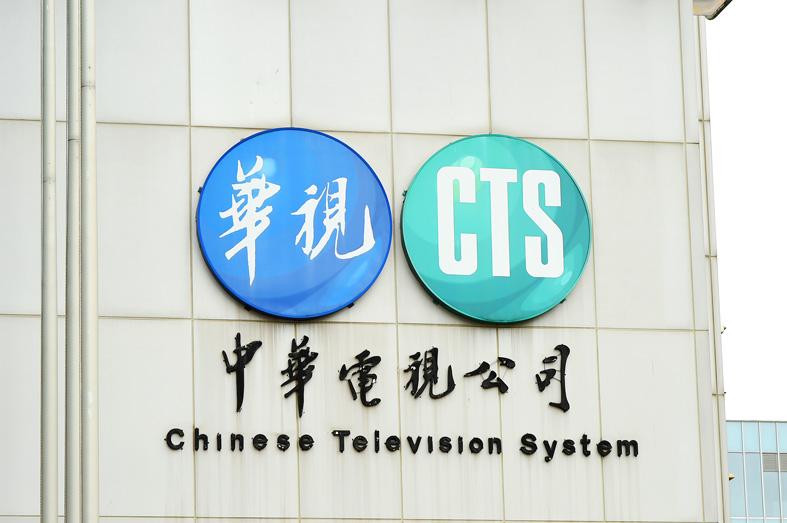Seven Chinese Television System (CTS) employees were disciplined for erroneously running news tickers announcing a Chinese invasion off the coast of northern Taiwan during its morning news program on Wednesday, the network said yesterday.
The news alerts were created by the New Taipei City Fire Department for disaster drill purposes. CTS apologized for the error in a statement on Wednesday, saying that the mistake occurred due to the oversight of a program director who was tasked to shoot a disaster drill video for the New Taipei City Fire Department.
The employee failed to restore the text file path of the screen layout after completing the recording on Tuesday, resulting in the error on the news program, it said.

Photo: Chen Yi-kuan, Taipei Times
The CTS ethics committee also convened on Wednesday afternoon for an emergency meeting, in which two program directors, along with five editors and producers, were held accountable for the incident.
The most serious penalty administered by the committee was a major demerit.
CTS acting general manager Chen Ya-ling (陳雅琳), who is currently in quarantine after a visit to the US, yesterday offered her resignation through videoconference in a board meeting of the Taiwan Broadcasting System.
Her resignation offer was rejected by TBS chairwoman Tchen Yu-chiou (陳郁秀), whose decision was seconded by other directors on the board.
Chen delivered a public apology on the network’s Wednesday evening news program.
“Managers and employees in the news department who were involved in the incident are to be disciplined. As CTS acting general manager, I will accept any reprimand the board administers,” she said.
Chen is to face questions from lawmakers at the legislature’s Education and Culture Committee on Monday morning.
The Investigation Bureau’s Taipei City Field Office and Cybersecurity Investigation Office yesterday interviewed a program director surnamed Chiang (蔣) and a subtitle editor surnamed Liu (劉) to determine if the network’s system had been hacked.

The manufacture of the remaining 28 M1A2T Abrams tanks Taiwan purchased from the US has recently been completed, and they are expected to be delivered within the next one to two months, a source said yesterday. The Ministry of National Defense is arranging cargo ships to transport the tanks to Taiwan as soon as possible, said the source, who is familiar with the matter. The estimated arrival time ranges from late this month to early next month, the source said. The 28 Abrams tanks make up the third and final batch of a total of 108 tanks, valued at about NT$40.5 billion

Two Taiwanese prosecutors were questioned by Chinese security personnel at their hotel during a trip to China’s Henan Province this month, the Mainland Affairs Council (MAC) said yesterday. The officers had personal information on the prosecutors, including “when they were assigned to their posts, their work locations and job titles,” MAC Deputy Minister and spokesman Liang Wen-chieh (梁文傑) said. On top of asking about their agencies and positions, the officers also questioned the prosecutors about the Cross-Strait Joint Crime-Fighting and Judicial Mutual Assistance Agreement, a pact that serves as the framework for Taiwan-China cooperation on combating crime and providing judicial assistance, Liang

A group from the Taiwanese Designers in Australia association yesterday represented Taiwan at the Midsumma Pride March in Melbourne. The march, held in the St. Kilda suburb, is the city’s largest LGBTQIA+ parade and the flagship event of the annual Midsumma Festival. It attracted more than 45,000 spectators who supported the 400 groups and 10,000 marchers that participated this year, the association said. Taiwanese Designers said they organized a team to march for Taiwan this year, joining politicians, government agencies, professionals and community organizations in showing support for LGBTQIA+ people and diverse communities. As the first country in Asia to legalize same-sex

MOTIVES QUESTIONED The PLA considers Xi’s policies toward Taiwan to be driven by personal considerations rather than military assessment, the Epoch Times reports Chinese President Xi Jinping’s (習近平) latest purge of the Chinese People’s Liberation Army (PLA) leadership might have been prompted by the military’s opposition to plans of invading Taiwan, the Epoch Times said. The Chinese military opposes waging war against Taiwan by a large consensus, putting it at odds with Xi’s vision, the Falun Gong-affiliated daily said in a report on Thursday, citing anonymous sources with insight into the PLA’s inner workings. The opposition is not the opinion of a few generals, but a widely shared view among the PLA cadre, the Epoch Times cited them as saying. “Chinese forces know full well that